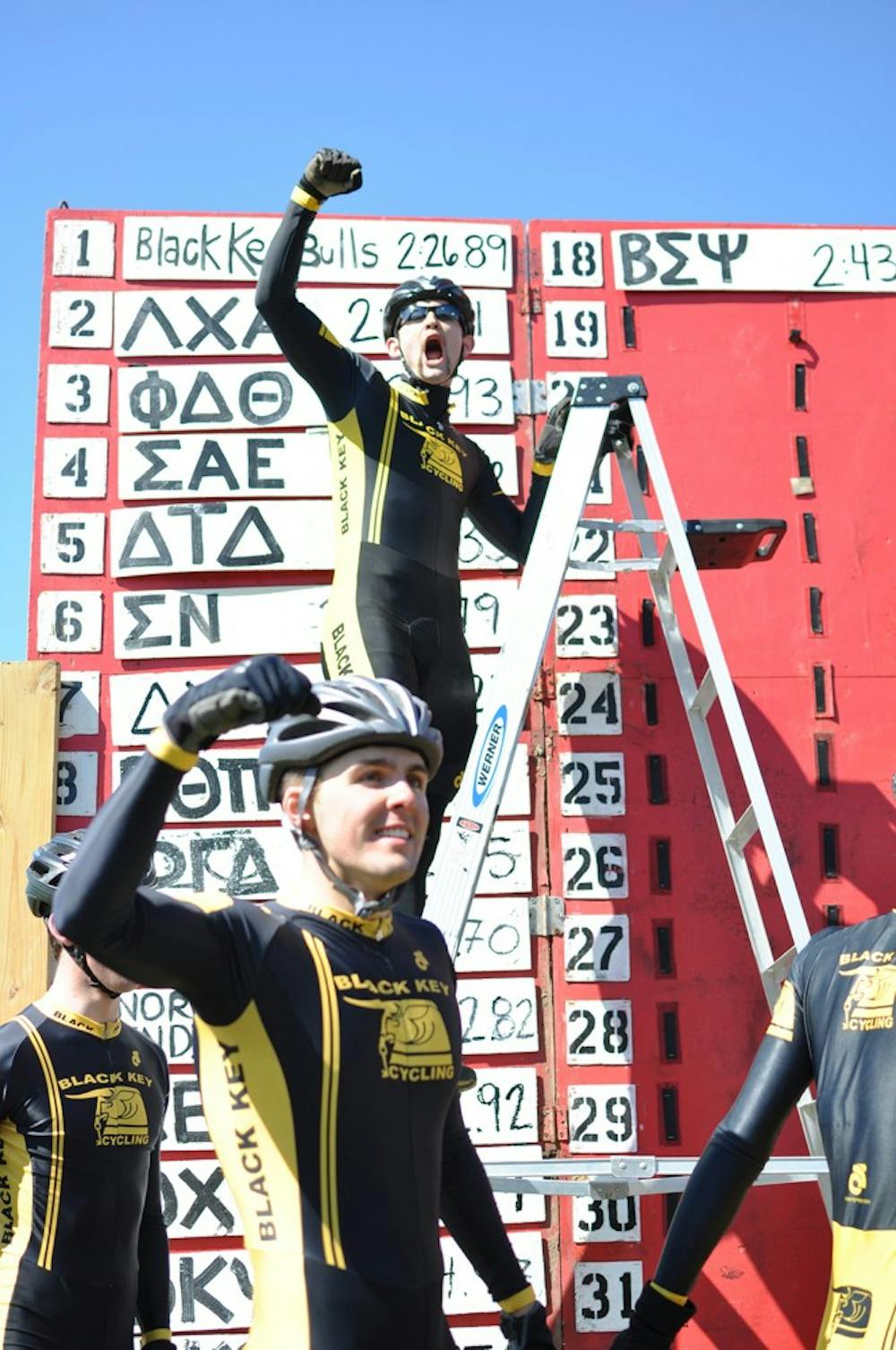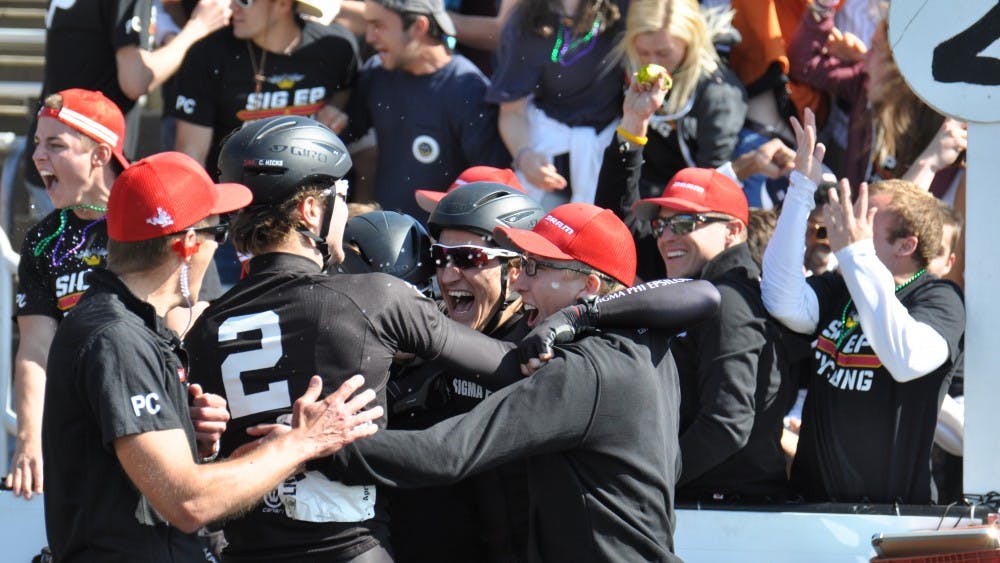But that problem is also their biggest strength.
The defending Little 500 champions had all seven riders finish in the top-third of Individual Tim Trials this year. Four of those seven were in the top 14, ahead of 25 other teams’ top riders.
They had so much depth that when it came time for Team Pursuit, they entered two teams. They took first and third, beating all but one other team with guys who could be considered leftovers.
What little difference there is between riders requires a stopwatch to detect. Finding the gap between the best and worst rider means splitting fractions of a second.
In racing, having too much speed is never a bad thing. But narrowing down the team will be the real challenge.
Of seven, only four will race.
“Something I figured out very quickly was I was going to be good enough to be an all-star on the 25th best team, or I could put in the work and essentially sit on the bench for a chance to ride with BKB,” senior Tyler Hart said. “With these guys, I had a chance to win.”
The other three riders will be watching from the sidelines where they wait for their chance to ride. They could just as easily switch teams, hop on a bike and join the race almost immediately.
But they don’t.
These riders don’t just want to race. They want to race as Black ?Key Bulls.
And at the end of the day, riding in the Little 500 is only part of what being a Black Key Bull is about.
“This is going to sound weird, but I don’t think any of us joined the team to race Little Five,” junior Nick Hartman said. “This team is more than that. I’m not just in this to ride in a bike race.”
The Black Key Bulls are an independent cycling team competing in an intramural cycling race largely made up of greek fraternities.
To an outsider, they’re the black sheep. They’re the outcasts without a home.
But the Black Key Bulls are more than an independent cycling team.
They’re family.
***
The Black Key Bulls started in 1961 at Ball State University as a joke between brothers Bob and Richard Otalski.
Richard was a member of the Blue Key Honorary Fraternity. But as Black Key Bulls’ legend has it, Bob didn’t like that name much.
Bob began calling it the “Black Key Dis-Honorary Fraternity.” Someone later decided the Dis-Honorary Fraternity needed an emblem and began using the Schiltz Malt Liquor Bull as the basis for the group’s mascot and logo.
The Black Key Bulls were born.
The organization wasn’t a fraternity. It didn’t have a permanent house or require members to pay dues and go through initiation. They were just a bunch of guys who hung out together and enjoyed riding bicycles.
And they were good at it, too.
The Black Key Bulls were dominant in Ball State’s intramural cycling race, Bike-a-Thon. They accumulated eight wins between 1965 and 1995.
It was a type of dominance that rivals that of Cutters in Bloomington’s Little 500. The Cutters team has 12 wins in the last 30 years.
But after the team won three consecutive wins from 1993 to 1995, Ball State suddenly shut down its intramural cycling race.
Bike-A-Thon died out, and with it, so did the Black Key Bulls.
***
In 2006, Dave Choinacky had an idea: Bring the Black Key Bulls to Bloomington.
The first thing he needed was a lead rider. That’s when Chapman “CT” Blackwell joined the picture.
Blackwell, a Purdue transfer, was one of the field’s best riders but had been bouncing around teams. He nearly pledged with Sigma Chi in 2005 after riding with another team, ACR, in 2004 before he was convinced to join the Black Key Bulls.
Lead rider in tow, Choinacky and Blackwell started recruiting.
They got in touch with Isaac Neff, a new student looking to join a team. He nearly joined Cutters and Dodds House before the guys at Black Key Bulls sold him on their vision.
“I heard their stories and what they were planning and I thought, ‘Oh, this is cool,’’” Neff said. “I wanted a different kind of program, and they had something different. Something new to Little Five.”
Still trying to get a team together, Blackwell got in touch with Ryan Knapp and Torrey Kittle and earned their pledges.
Within a couple months of forming, Black Key Bulls had a full team.
Together, they qualified 22nd in the spring of 2006 and gained 15 spots on race day to finish 7th in their first attempt.
Kittle was the only rider to graduate that year. Andy Roberts took his place in 2007 to help Black Key Bulls finish third in just their second try.
“It’s crazy to think how quickly it all happened,” Neff said. “We formed as friends and just sort of ran with it.”
***
There is no application process to join the Black Key Bulls.
They don’t hold rush events or open houses. Riders don’t hand out bids or host tryouts. The team forms through friendships.
The process has remained unchanged even a decade after the Bloomington team was founded and four decades removed from the original “dis-honorary fraternity.”
Friends who like cycling find friends who like cycling.
“It’s an organic process,” Hartman said. “It’s not like we put out fliers or anything. People find us one way or ?another.”
Speaking together at Club Wiener — the name given to the off-campus home of sophomores Charlie Hammon, Lucas Kalbfell and Michael Chettleburgh — the seven riders laugh as they retell the stories of finding Black Key Bulls.
Hart said he discovered the team in Hyper-E 112, a cycling class taught by former BKB rider Ren-Jay Shei. Spencer Brauchla, another senior, said he initially figured he’d join a team a few weeks before race day before learning about the commitment required.
A third senior, Maddison Russell, was a member of IU’s run club for three years before just this year deciding he wanted a chance to ride for the defending champs.
The riders laughed as they recounted their own stories of finding the team.
Hammon and Kalbfell found the team as freshmen through Hart’s girlfriend.
Chettleburgh learned of BKB only after asking an orientation leader, “How many schools come to race in ?Little Five?”
“We were so green,” someone shouted after hearing Chettleburgh’s story. The entire room burst out ?laughing.
“Quite frankly, I don’t care how fast you are on a bike,” Hartman said. “We don’t really look at that. You have to have a good personality first. We can make you a good ?cyclist.”
Counter intuitive? Maybe.
But cycling doesn’t define who the Black Key Bulls are. It’s just something they like to do.
***
The defending Little 500 champions like to go by another title: “The People’s Champs.”
Who calls them that? Well, they do. Admittedly, it’s a self-imposed nickname. But they believe it’s a fitting one.
It reflects the team’s culture. The Black Key Bulls aren’t anti-Greek, but without any affiliation, they wanted to connect to the independent students on campus.
“The People’s Champs is just kind of an attitude,” Hart said. “We’re an independent team. A bunch of GDI’s. I think that has a common connection with people.”
It’s a connection not unlike that of Cutters, a fellow independent team. But that’s where the similarities stop.
Hart said organizationally, the teams are just different. They almost foil one another.
BKB tries to take on a less-serious persona, almost to the extreme.
They have an active Twitter account that they use to crack jokes at race director Jordan Bailey — a former BKB rider — and recount efforts to secure sponsorship from Burger King, a fast-food favorite among the riders since 2010 when people called them “The Burger King Boys.”
“I keep going back to it — this is just fun,” Chettleburgh said. “I love the hard work we do, but at the same time, we’re in this to have fun with each other.”
***
Brauchla didn’t want to admit it out loud, but a year ago, doubt started to creep into the back of his mind.
The first 16 riders came. The first 16 riders went. No race wins.
Maybe the system was broken. Maybe the Black Key Bulls couldn’t win the Little 500. Maybe they needed to commit to finding the best cyclists first, not just friends.
“There was just that question in the back of my head,” Brauchla said. “Can it really be done?”
Brauchla helped answer that question with a win in 2014. Three seniors graduated with the Borg-Warner Trophy. The weight of doubt was lifted off the team’s shoulders.
But as quickly as that weight was lifted, another was put back on. More questions were raised.
What would have happened if there wasn’t a crash on lap 199 that allowed Jacob Miller to coast to victory?
Brauchla is the only rider to return from the race-winning team. Maybe last year’s result was a fluke.
“We feed off that,” Hammon said. “We feed off each other, really. We just love being around each other so much that we’re pushing each other to answer any questions about the team.”
The latest question: “Can the Black Key Bulls really repeat as Little 500 ?champions?”
***
On Easter Sunday, the Black Key Bulls family was shaken.
CT Blackwell died after a nearly 13-month battle with cancer. Riders past and present mourned the death of the first modern-day Black Key Bull.
“CT was the definition of cool,” Hart said. “He was who you wanted to be when you grow up.”
There’s a connection between these riders that even they have a hard time ?explaining.
The current sophomores were elementary school students during Blackwell’s time, but even they felt the sting of losing a teammate.
The Black Key Bulls said they will be riding for Blackwell on race day.
They’ll have decals on their bikes and wear Jordan armbands — “Just like CT used to wear,” Brauchla said — in his memory.
The riders said they feel a connection to Blackwell because he was one of them.
He helped pick the first generation of Black Key Bulls. That generation selected the next. The third picked the fourth, passing the legacy down.
“It’s funny, people ask, ‘How do you keep this culture?’” Hart said. “The people on this team are picking the next generation. It starts to snowball. One way or another, we’re all connected.”
That’s why alumni join at the track on race day. It’s why Gomez was with the team watching them during qualifications and why Neff comes down during spring break to help prepare the team’s bikes.
Riders never really leave the Black Key Bulls.
They just run out of race eligibility.






